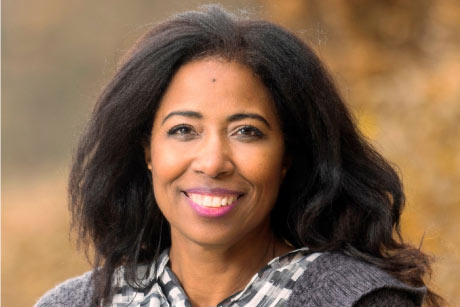Uncovering the Contributions of Black Women to Economics

Nina Banks, president of the National Economic Association and associate professor at Bucknell University.
In recent decades, a growing literature has revealed the scientific contributions of women and people of color that have previously been hidden or forgotten. But highlighting the work of these figures comes from the efforts of people like Nina Banks, associate professor at Bucknell University and president of the National Economic Association.
In 2003, Banks began to research the work of Sadie T.M. Alexander, the first Black American to receive a doctorate in economics. After years of research, the resulting work was Democracy, Race and Justice: The Speeches and Writings of Sadie T.M. Alexander, a book published by Yale University Press in 2021.
By examining her writings from the 1920s to the 1970s, Banks found Alexander to be someone who not only focused on the economic condition of African Americans but also challenged public policies that “created racial inequities.”
“I also found that she was the first economist in the United States to advocate for a federal job guarantee. We thought that Hyman Minsky was the first in the 1960s,” Banks said in a podcast interview with the St. Louis Fed. “So, those were some of the things that I found early on which helped to set the historical record straight.”
In a Women in Economics Podcast Series episode, Banks discussed her archival research on Alexander, the challenges of funding for research, the need to rethink the idea of economic activity, and her own research on community activism as unpaid work. The episode includes a transcript of the interview.
Alexander was ahead of her time, contemplating topics that are still in the forefront of current policy debates, Banks noted.
“We're having discussions about Black farmers. She talked about Black farmers. She talked about policing and over-policing. She talked about ... full employment and the need for federal job guarantees to deal with the persistence of racial discrimination in labor markets,” she said. “I mean, just a lot of issues tied to democracy.”
Meanwhile, Banks is making her own contributions to the economics profession. Her focus has been the unpaid labor that Black women make for the community through activism.
Feminist economists have argued that since household work—which is disproportionately done by women—is valuable and contributes to the well-being of household members, the value of this unpaid work disproportionately done by women can determined by the market prices of similar services, such as laundry or child care, Banks explained.
“But at some point, I came to realize that that approach really overlooks ... a lot of the work that women of color, racially marginalized women in the United States, are producing for their communities,” she said.
Many activities that are considered to be political, such as activism, also incorporate unpaid work, and thus the community is a site of unpaid work, just like households, she noted.
“The community also needs to be elevated on par with the firm and the household as a site of production,” she said. “And if we do that, we can have a much more meaningful analysis of the way in which racial inequities are reproduced and sustained within communities because of racial exclusion and isolation and various forms of violence, physical and structural violence.”
Citation
ldquoUncovering the Contributions of Black Women to Economics,rdquo St. Louis Fed On the Economy, Jan. 17, 2022.
This blog offers commentary, analysis and data from our economists and experts. Views expressed are not necessarily those of the St. Louis Fed or Federal Reserve System.
Email Us
All other blog-related questions

